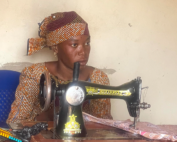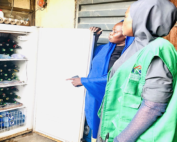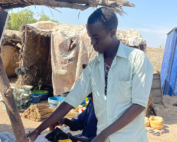UNHCR-AUN Livelihood Intervention in Borno State.
Background information
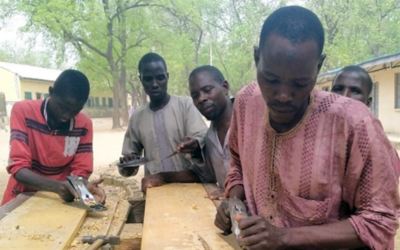 In Borno State, UNHCR, in partnership with the American University of Nigeria (AUN) under the livelihood project, provides vocational skills training and livelihoods, including agriculture and micro business, to IDPs, IDPs and Refugee returnees and members of the host community in Bama, MMC, and Ngala LGAs. This response has been in effect since 2016, with thousands of male and female members of the affected population trained in various skills, including masonry, carpentry and joinery, iron bending, electrical installations, sewing, fisheries, and animal and crop production. Others were trained in micro business skills, groundnut oil extraction, and fries.
In Borno State, UNHCR, in partnership with the American University of Nigeria (AUN) under the livelihood project, provides vocational skills training and livelihoods, including agriculture and micro business, to IDPs, IDPs and Refugee returnees and members of the host community in Bama, MMC, and Ngala LGAs. This response has been in effect since 2016, with thousands of male and female members of the affected population trained in various skills, including masonry, carpentry and joinery, iron bending, electrical installations, sewing, fisheries, and animal and crop production. Others were trained in micro business skills, groundnut oil extraction, and fries.
Since the UNHCR intervention in 2016, about 6000 beneficiaries have been trained in livelihoods and empowered to start various businesses. Of these numbers, 65 cooperatives, each comprising 10 members, have been set up, and the rest have been supported individually.
| Year | Persons Reached | Indirectly reached as members of households |
|---|---|---|
| 2016 | 500 | 5,000 |
| 2017 | 1,000 | 10,000 |
| 2018 | 1,500 | 15,000 |
| 2019 | 2,500 | 25,000 |
| 2020 | 1,000 | 10,000 |
| 2021 | 1,275 | 12,750 |
| 2022 | 1,275 | 12,750 |
| 2023 | 1,200 | 12,000 |
| Total | 9,750 | 102,500 |
Of the 269 cooperatives formed and empowered in the BAY states since 2018, 162 were in Borno state, distributed across the target local government areas (LGAs) of Bama, Ngala, Damasak, MMC, and Jere. Tracking data from AUN Monitors as of Oct. 2022 indicate that about 85 of these cooperatives are still functional. The sustainability of the cooperatives was negatively affected by the return of the PoCs to their LGAs. Upon return, it was no longer feasible for the cooperative to remain as PoCs returned to their different communities. In addition to the return factor, many cooperatives disbanded due to the desire to meet urgent food needs. As a result of these factors, AUN de-emphasized the empowerment of PoCs through cooperatives and focused on empowering most PoCs in small businesses owned by individuals. This approach is now having a significant impact as almost 97% of these new businesses have been sustained and are making an income, enabling the PoCs to send their children to school, improve household nutrition, and protect them from SGBV as they can now meet most of their needs.
2023 livelihood target in Borno State.
In 2023, some 1,420 beneficiaries comprising male and female IDPs, and Refugee returnees, and host community members have been targeted under the micro business, livestock, vocational skills, fishery, and crop farming training in Borno State.
Table 1. Summary of Individuals trained in Livelihood interventions in Bama from 2020 – 2023.
Trained and Empowered Beneficiaries from 2020 – 2023
| Year | Vocational skills | Micro Business | Livestock Production | Crop Farming | Cap Making | ICT | Dry season Farming | Total |
|---|---|---|---|---|---|---|---|---|
| 2020 | 40 | 100 | 20 | 100 | 200 | 0 | 0 | 460 |
| 2021 | 40 | 0 | 0 | 0 | 30 | 10 | 0 | 80 |
| 2022 | 80 | 90 | 30 | 100 | 90 | 10 | 300 | 700 |
| 2023 | 10 | 40 | 10 | 140 | 0 | 10 | 700 | 910 |
| Grand Total | 2,150 |
2023 livelihood target in Bama.
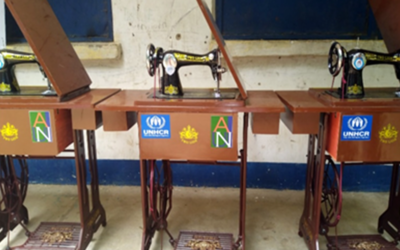 Since 2020, AUN has trained and empowered about 2150 Pos in Bama. Of these, 520 were in 52 cooperatives, while 1,630 were empowered individually. The target for the year is 910 beneficiaries. The beneficiaries include IDPs, refugee returnees, and host community members. So far, from January to May, about 880 beneficiaries have been trained and empowered in crop farming, livestock, micro business, vocational skills (tailoring and ICT), and dry season farming. The beneficiaries are selected from the most vulnerable households and survivors of SGBV.
Since 2020, AUN has trained and empowered about 2150 Pos in Bama. Of these, 520 were in 52 cooperatives, while 1,630 were empowered individually. The target for the year is 910 beneficiaries. The beneficiaries include IDPs, refugee returnees, and host community members. So far, from January to May, about 880 beneficiaries have been trained and empowered in crop farming, livestock, micro business, vocational skills (tailoring and ICT), and dry season farming. The beneficiaries are selected from the most vulnerable households and survivors of SGBV.
- Vocational skills 20 beneficiaries – computer appreciation training (10) and tailoring (10). Empowering kits for the tailoring beneficiaries include 60 pieces of sewing thread, 12 scissors, 1 sewing machine per head, 12 pieces of measuring tape, 1 packet of chalk, 12 pieces of lubricating oil, and 1 pack of sewing needles. Additionally, they will be supported with a working capital of N20,000 per head to support the maintenance and installation of the machines.
- Micro-business 40 beneficiaries (groundnut oil extraction, frying and baking, grain and flour selling, etc.) Graduated beneficiaries will be empowered with a business startup kit worth N50,000 per head and a working capital worth N7,500.
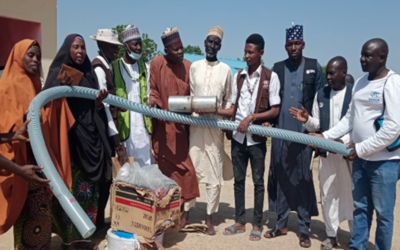 Support for dry Season Farming – in support of dry season farming, 36 tube wells were drilled in Soye (8), Kaleri (8), Jaudari (8), and Angwan Yashi and Kwata in Bama (12). In addition, UNHCR distributed 36 water pumps to farmer groups to boost their dry-season farming activities.
Support for dry Season Farming – in support of dry season farming, 36 tube wells were drilled in Soye (8), Kaleri (8), Jaudari (8), and Angwan Yashi and Kwata in Bama (12). In addition, UNHCR distributed 36 water pumps to farmer groups to boost their dry-season farming activities.
Other related livelihood Interventions
- Formation of Cooperatives: Beneficiaries of vocational skills, Micro business, and farming have been supported to form cooperative groups to ease their access to the benefits accrual to groups. These benefits include ease of Bank account opening, ease of accessing loans from microfinance banks, etc.
- Basic Business Literacy: Each category of the beneficiaries was provided with business development skills to manage their businesses effectively.
- Women and Girls Friendly Safe Spaces (WGSS) and Child–Friendly Safe Spaces (CFS) – UNHCR and Partners BOWDI and Caritas operate a WGSS and a CFS, respectively, in Bama. Apart from the primary functions for which they were established, these facilities offer life skills for the women and children attending activities in the facilities. The life skills training includes cap making, hand fan making, pasta making, sewing, soap making, and crotchets.
Success Stories
- In Ngala, the Keke Napep business started in 2018 and is still going on and has expanded; the amount raised so far, and the cooperative is generating millions of naira.
- Did an Arts and Crafts printing business start in MMC in 2018? It is ongoing and is the printer for many partners in Maiduguri and beyond. With a start-up capital of just N75,000, the business now employs 20 PoCs and generates more than N150,000 thousand monthly
- In Bama, cooperatives trained in carpentry have been engaged by other organizations for shelter construction and repairs in the Camps and Host community and are making approximately N50,000 monthly.
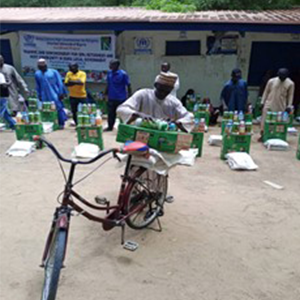 Also, under individual empowerment, AUN has recorded many impacts where families dependent on the government and other organizations for feeding can now feed themselves and send their children to school. E.g. Yaya Naga, a person with special needs, was trained and empowered under condiments (Kayan Miya) and made profits of 30,000 nairas monthly.
Also, under individual empowerment, AUN has recorded many impacts where families dependent on the government and other organizations for feeding can now feed themselves and send their children to school. E.g. Yaya Naga, a person with special needs, was trained and empowered under condiments (Kayan Miya) and made profits of 30,000 nairas monthly.
Safya Musa is one of the trained and empowered beneficiaries whose husband left her with four children with no means of livelihood; when she arrived in Maiduguri, she camped at a teachers’ village and depended on the government and organizations for support when the camp was closed as a result of relocation of IDPs to their various local government, she was part of those who could not return to her place of origin due to reason best known her. She was enrolled for livelihood training under the Urban IDPs program was trained in tailoring and was given business starter packs which includes sewing machines and other items. Safya started her business with no waste of time; the business progressed and was generating income. She now can take care of her children independently and send them to school, buying school uniforms, books, and bags for the children. Initially, she did the business at her home, but now she has rented a shop and has customers who come to the shop to patronize her business.
